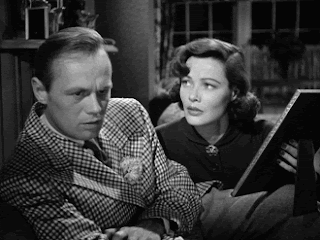Monday, 5 October 2015
Blu-ray Review: Night And The City (BFI)
Meet Harry Fabian. Truth to tell, he's probably not the type of person you'd wish to encounter but it wasn't always like that.
Witness the scene where long suffering partner Mary (Gene Tierney) picks up a photograph of the pair and declares "Look at the people we used to be."Somewhere along the line, Fabian - played by Richard Widmark - was a decent man until his desire to be someone well and truly took root. Now, Harry is a hustler chasing the big bucks via a series of moneymaking schemes that end in tears, invariably leaving his partner holding the dirty end of the stick.
£100, £400 or a crisp £5 note... to Harry, it's just stake money on a game that can't go wrong but always does.
He inhabits a shadowy world where forgers, hookers and spivs peddle their wares, with enough mug punters and desperate clients to keep the wheels turning nicely. Harry's latest venture involves the chance to run London's wrestling circuit, after an encounter with old-time legend Gregorius ( Stanislaus Zbyszko) whose son Kristo (Herbert Lom) can see through Harry immediately. Thus, father is turned against son while Harry's endeavours to secure finance for a clash of wrestling titans may well make him the someone he craves to be.
Harry gets one half of the backing from Philips Nosseross (Francis L. Sullivan); owner of The Silver Fox club, whose wife Helen (Googie Withers)sees a way out of their marriage, aiming for a life of "ease and plenty" as Fabian is so fond of saying. This ill-fated alliance leaves battle-scarred victims in its wake, with scarely a likeable character on view. Even bumbling gourmet Adam Dunn (Hugh Marlowe) sets the hackles rising, just waiting for Fabian to trip up for the final time so he can win Mary's affections. In the end, it's only Gregorius that wins any sympathy, really tugging at our heartstrings when he asks for a window to be closed in a highly emotional scene.
For all that, it's a pleasure to watch the cast at work: Withers as the deliciously self-centred Helen; Sullivan having a ball with big Phil's scheming character and Widmark's take on Fabian who ultimately discovers that London is a very small place when you're on the run.
DOP Max Greene constructed a marvellous monochrome world here, with low camera angles, shadows on walls and ceilngs and famous London landmarks acting as a backdrop to enthralling doses of backstabbing and nefarious dealing in 1940s London.
Quite possibly director Jules Dasson's finest, and a film noir par excellence.
Green's cinematography certainly looks even more impressive on the BFI Blu-ray which unveils the American version of this film from a 4K scan. The films looks gorgeous here, with excellent contrast and detail, while the British version benefits from a 2K scan. There are several differences between the two cuts: the English version initially gives us a glimpse of two people reminded even more strongly of how things were before Harry's hare-brained ideas held sway and there's a different take on the scene where Helen Nosseross makes a startling discovery.
The two versions have different scores: Franz Waxman on the American version and Benjamin Frankel on the British cut which also features narration from Dassin.
The extras begin with two commentary tracks. The American cut sees Paul Duncan - writer and editor of film noir books - take the microphone. Paul talks about Gerald Kersh's novel; script revision; various stars who were approached to appear in the film; the challenges posed by shooting at busy London locations and MPAA directives regarding some of the scenes. The English version offers a commentary track from film scholar Adrian Martin who highlights the differences between the two cuts and the cosmopolitan aspects of the film. Adrian also discusses the novel; identifies locations used in the film and makes comparisons with both Orson Welles and "Force Of Evil".
Two excellent tracks that will heighten your appreciation of just what was accomplished here.
Next up is The Guardian Lecture: Jules Dassin Interviewed By Alexander Walker. (51m 38s)
The interview plays out to a series of images from the film, and includes Dassin's recollection of how he made the transition to Hollywood - a place that had "very little mind of its own." Dassin recalls films that influenced him; discusses the blacklist and his subpoena to appear before the Unamerican Activities Committee, and also takes questions from the audience for the last 5 minutes.
Richard Widmark Interviewed By Adrian Wooton At The National Film Theatre (1 hr 12m)
Recorded in July 2002, this very special event is a joy to view. Widmark talks fondly about his radio and theatre days; his debut feature in 1947 titled "Kiss Of Death"; his approach to acting and love of the studio system and the "great experience" of working on "Night And The City". Again, the audience are invited to ask questions, which include a query about the differences between acting in monochrome and colour which brought the house down. Hugely entertaining and informative.
The BFI have included a booklet which features an essay by Lee Server; Paul Duncan's piece on the film, novel and remake, and James Hahn's article on the two versions of the film.
A highly recommended release.
Subscribe to:
Post Comments (Atom)







No comments:
Post a Comment